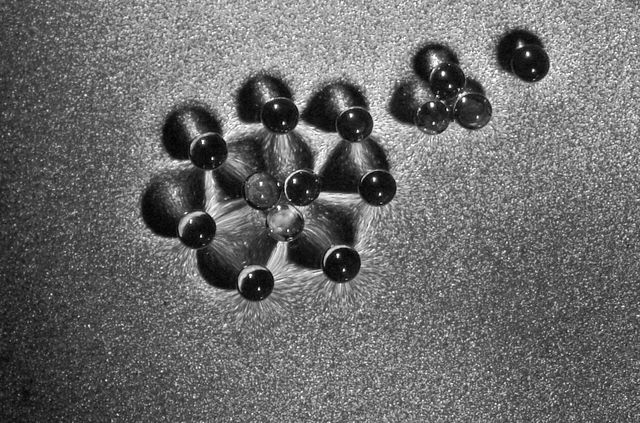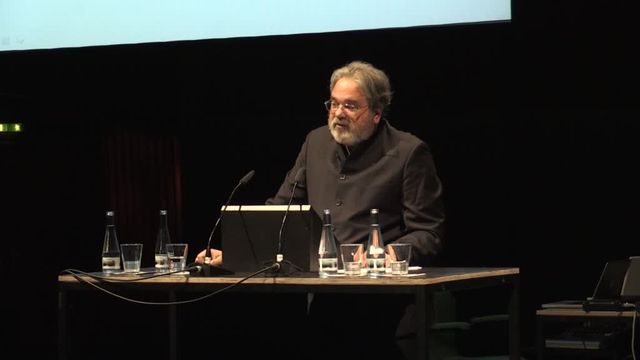Lecture Performance, Talk, Concert
Time’s Attack on the Rest of Life: Experiment
With Hans-Jörg Rheinberger, Sandeep Bhagwati, Evelina Domnitch & Dmitry Gelfand. Musicians: Felix Del Tredici, Navid Navab, Julian Stein, VALEKRIY

Time as a governing system is manifest in all realms of life. In the global village of technological time everyone can receive information any time from every possible place. There are no limits to wireless communication. It forms the basis for financial markets and in turn permanently speeds up the world. The future is already being used up by the present and blocked by huge amounts of data, trash and debt. With real-time communication and global mobility two time resources were lost: our sense of the past, which lends us our identity, and the utopian potential of our future.
During the opening of “100 Years of Now,” four events examine the period of one hundred years as a space for historical imagination of varying dimensions and nexuses of time: Which forces shape the dominant concept of time in accelerated capitalism? How does it affect our perception and interpretation of the world? How is time produced in experiments and in the laboratory? How do historical events, texts and cultures become spaces we can experience? And how do other notions of time enable alternative courses of action?
How do artistic and scholarly approaches and experiments affect how we experience time? How is our conception of time shaped by representations? The talk explores how time is frozen or accelerated in experiments, fixed in musical notation, or can be made perceptible in free improvisation, while scholarly, musical and artistic approaches will be brought into dialogue. Strictly composed experiments in the realm of quantum physics and music will be experienced as “comprovised” experiments between a preconceived concept and spontaneous improvisation.
Biographies
Hans-Jörg Rheinberger is a molecular biologist and historian of science. He studied philosophy, linguistics, and biology in Tübingen and Berlin. He is an honorary professor for the history of science at Berlin’s Technische Universität, holds an honorary doctorate from ETH Zürich, he is a member of the Berlin-Brandenburgische Akademie der Wissenschaften and the Leopoldina and former director of Berlin’s Max Planck Institute for the History of Science. His current research interests are the history and epistemology of experimentation and the relationship between the sciences and the arts.
Sandeep Bhagwati is a prize-winning composer, director, and media artist and holds the Canada Research Chair for Inter-X Art at Montreal’s Concordia University, where he directs the matrallab, which he also founded. He is a former professor for composition and multimedia at Hochschule für Musik Karlsruhe as well as director of the Hexagram-Concordia Centre for Research-Creation in Media Arts and Technologies. He directed several Festivals for new music (A•Devantgarde München, Klangriffe Karlsruhe, and Rasalila at Haus der Kulturen der Welt, Berlin).
Navid Navab is a Montreal based composer, improviser and audio-visual sculptor. For several years Navid has been an experimental researcher at IRCAM, CRIMMT, CNMAT, Topological Media Lab and Matralab. His award-winning pieces, which take on the form of gestural sound compositions, responsive architecture, site specific or theatrical interventions or kinetic sound-sculptures have been presented internationally at Canadian Center for Architecture, Festival du Nouveau Cinema, Shanghai eArts, Roulette New York, Western Front Vancouver, McCord Museum, Musée d'art Contemporain de Montréal, Timisoara Romania, Contemporary Arts Museum Houston, International Digital Arts Biennial, Festival International Montréal/Nouvelles Musiques, and CURRENTS Santa Fe among others.
Julian Stein is a sound and media-artist based in Phoenix, Arizona, whose work ranges from soundscape and electroacoustic composition to collaborative performance and kinetic sound installation. His work has been presented at renowned new-media arts festivals including MUTEK (Montreal, QC), MATA (New York, NY), ELEKTRA (Montreal, QC), and Electric Eclectics (Meaford, ON). Julian is a co-creator of the Montreal Sound Map, and currently a research associate at Matralab, part of the Hexagram Institute for Research/Creation at Concordia University.
Felix del Tredici is an “extraordinarily versatile trombonist” (New York Times) who gives performances that are “disturbing yet fascinating”. He is a member of Ensemble Moto Perpetuo, the Fonema Consort, and the New York Trombone Consort, he has performed with Ensemble Transmission, Ensemble Signal, and Klangforum Wien. Felix is a research assistant at Matralab, and collaborates closely with the Topological Media Lab. He is based in New York City.
VALEKRIY (Valerie Schepper) engages with both audible and inaudible acoustic vibrations as an artistic as well as medicinal practice. In the 1980s he founded Popolznowenje, a “ritual research orchestra.” While touring through Western Europe with his orchestra in 1991, the Soviet Union dissolved, prompting Valekriy to emigrate to the Netherlands where he has since remained. Valekriy's phenomenological approach to acoustics allows listeners to surmount their perceptual boundaries and delve into the very nature of sound.
Evelina Domnitch (St. Petersburg, Russia) & Dmitry Gelfand (Minsk, Belarus) create sensory immersion environments that merge physics, chemistry and computer science with uncanny philosophical practices. Current findings, particularly regarding wave phenomena, are employed by the artists to investigate questions of time-perception. The sciences, which serve as the basis for contemporary thought, still cannot encompass the unrecordable workings of consciousness. Domnitch and Gelfand's performances generate immediate sensory experiences without recording them in order to allow observers to transcend the illusory distinction between scientific discovery and perceptual expansion.
